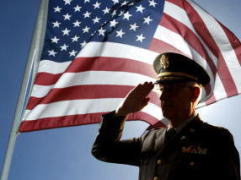 ABC reported earlier this month on the results of a national survey conducted by a market research firm on the topic of obesity in America. The firm, NPD Group, asked 1,900 people across the country whether they found overweight people less attractive than those who weighed normal. They found that the amount of people in America who find overweight people unattractive is only about 24 percent, down from 55 percent when the same study was conducted 20 years ago. These results come as no surprise when one considers that about two thirds of America is overweight.
ABC reported earlier this month on the results of a national survey conducted by a market research firm on the topic of obesity in America. The firm, NPD Group, asked 1,900 people across the country whether they found overweight people less attractive than those who weighed normal. They found that the amount of people in America who find overweight people unattractive is only about 24 percent, down from 55 percent when the same study was conducted 20 years ago. These results come as no surprise when one considers that about two thirds of America is overweight.Many people have offered differing explanations for the results of this survey. Some attribute them to the increase in political correctness, according to the ABC story. They say that although it has become more accepted in the public forum, a strong stigma still surrounds overweight people behind closed doors.
Whatever the reasons, people do not seem to care as much as they used to about a person’s weight. Perhaps we have all become accustomed to obesity because it has been gradually increasing in frequency over the past 20 years. It is like when you see people every day you do not notice changes they undergo, but stay away for a week or a month and those changes become all the more obvious.
Maybe we just do not notice we are getting fat. I think a more likely reason is we do not care.
But there is no reason to care. Our society consistently caters to the minority fringe groups demanding acceptance. It has become OK to be different and even encouraged.
We are trained as a society to tolerate those with whom we do not agree. If a person chooses to advocate the destruction or enslavement of a certain race or religion of people, we ignore them politely and hope they go away. If someone chooses to live his or her life in an unhealthy way, we sigh silently and wish them the best even though we know they probably know better.
I am not saying that we should not allow these people to make their own decisions, but I am saying there should be consequences, real consequences, for those actions.
There should be a stigma surrounding overweight people. Acceptance is not something that everyone deserves. Since the dawn of man, we have used isolation and ostracism as forms of social control when people behave in ways that do not benefit the whole. Unity and cohesion are things that are built into our psychology as humans, and anything that challenges them mostly likely should be removed, especially if it is harmful to the group.
And believe me, obesity is harmful.
One does not have to be a doctor to understand the health risks that obesity poses. Diabetes, heart problems and arthritis are the first things that come to mind. Are we saying it is OK to place ourselves at risk like this? Is it OK to be overweight? According to this survey, I guess it is.
Shame on us all. We have stood by silently as America has eaten itself halfway to death. We pass by stores like Lane Bryant, Torrid and Casual Big & Tall and never give them a second thought. We super size, biggie size, go large and jumbo size until we cannot fit another bite in our mouths. We take up the diet of the month and think that eating no carbohydrates or all vegetables or whatever the next diet guru tells us to will make us fit and healthy.
We expect the quick fix. That is the quintessential problem with Americans. We do not like waiting for results. And what better way to expedite the task of getting in shape than to just stop caring? No work, no fuss and no guilt.
And therein lies the problem.
It is so much easier to just not care. We do it all the time. We have shown the world time and time again that we do not care about important subjects, like our own political processes, international issues like the tragedies in Darfur or the AIDS epidemic in Africa, or environmental concerns like the Kyoto Protocol.
It is a lot easier for Americans to just pretend these problems do not exist, and obesity is no different. The big difference between obesity and these other major issues is the problem of obesity has a very simple solution: eat healthy and get some exercise.
There is no trick to being healthy. People know when they are doing something unhealthy, but they usually do it anyway because often times it is the easier choice. Is it easier to make a sandwich at home and drink a glass of water or is it easier to run by Carl’s Jr. or McDonalds and pick something up on the way home? The answer is obvious.
We need to start caring about ourselves again. We need to let people know when we do not agree with them or their lifestyles. If they are still happy with the way they live their lives then more power to them, but at least they will know that other people are not. It is imperative that we change our attitudes concerning health and obesity. As I said earlier, being obese should never be OK. We should strive to be healthy. We should work for it, and work hard. Remember, anything worth having is never easily obtained.


